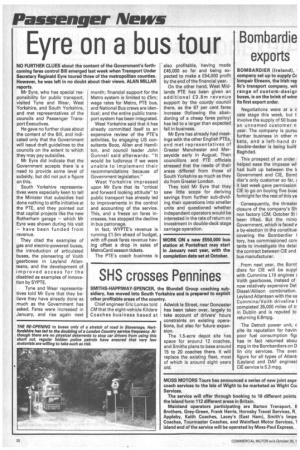Passenger News
Page 14

If you've noticed an error in this article please click here to report it so we can fix it.
Eyre on a bus tour
NO FURTHER CLUES about the content of the Government's forthcoming fares control Bill emerged last week when Transport Under Secretary Reginald Eyre toured three of the metropolitan counties. However, he was left in no doubt about their views. ALAN MILLAR reports.
Mr Eyre, who has special responsibility for public transport, visited Tyne and Wear, West Yorkshire, and South Yorkshire, and met representatives of the councils and Passenger Transport Executives.
He gave no further clues about the content of the Bill, and indicated only that the Government will issue draft guidelines to the councils on the extent to which they may pay subsidies.
Mr Eyre did indicate that the Government accepts there is a need to provide some level of subsidy, but did not put a figure on this.
South Yorkshire representatives were especially keen to tell the Minister that subsidies had done nothing to stifle initiative at the PTE, and they pointed out that capital projects like the new Rotherham garage — which Mr Eyre was shown during his visit — have been funded from revenue.
They cited the examples of gas and electric-powered buses, the introduction of articulated buses, the pioneering of Voith gearboxes in Leyland Atlanteens, and the development of improved access for the disabled as examples of innovation by SYPTE.
Tyne and Wear representatives told Mr Eyre that they believe they have already done as much as the Government has asked. Fares were increased in January, and rise again next month; financial support for the Metro system is limited to £5m; wage rates for Metro, PTE bus, and National Bus crews are identical; and the entire public transport system has been integrated.
West Yorkshire said that it has already committed itself to an expensive review of the PTE's activities, by engaging US consultants Booz, Allen and Hamilton, and council leader John Gunnell said afterwards: "It would be ludicrous if we were unable to implement their recommendations because of Government legislation."
West Yorkshire impressed upon Mr Eyre that its "critical and forward looking attitude" to public transport has already led to improvements in the control and accounting of the service. This, and a freeze on fares increases, has stopped the decline in bus patronage.
In fact, WYPTE's revenue is running £1.5m ahead of budget, with off-peak fares revenue having offset a drop in sales of MetroCard season tickets.
The PTE's coach business is also profitable, having made £45,000 so far and being expected to make a £54,000 profit by the end of the financial year.
On the other hand, West Midlands PTE has been given an additional £3.8m revenue support by the county council there, as the 67 per cent fares increase (following the abandoning of a cheap fares policy) has led to a larger than expected fall in business.
Mr Eyre has already had meetings with the other English PTEs, and met representatives of Greater Manchester and Merseyside early in August. Then councillors and PTE officials stressed that the needs of their areas differed from those of South Yorkshire as much as they do from Greater London.
They told Mr Eyre that they saw little scope for deriving savings from further sub-dividing their operations into smaller units and questioned whether independent operators would be interested in the rate of return on investment in double-deck stage carriage operation.






































































